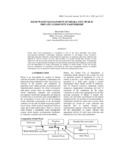| dc.contributor.author | Zahur, Moushumi | |
| dc.date.accessioned | 2010-10-10T04:39:34Z | |
| dc.date.available | 2010-10-10T04:39:34Z | |
| dc.date.issued | 2007 | |
| dc.identifier.uri | http://hdl.handle.net/10361/399 | |
| dc.description.abstract | Urban solid waste management is considered as one of the most immediate and serious environmental problems confronting municipal authorities in developing Asian Countries. Although municipal authorities acknowledge the importance of adequate solid waste collection and disposal as well as resource recovery and recycling, it is mostly beyond their resource to deal effectively with the growing amount of solid waste generated by the expanding cities. Consequently solid waste is indiscriminate by dumped on roads and into open drains thus leading to serious health risk and degradation of living environment for millions of urban people. In the last decade, however, importance of community involvement in solid waste management and use of adapted technologies were recognized for improving the solid waste management system. | en_US |
| dc.language.iso | en | en_US |
| dc.publisher | BRAC University | en_US |
| dc.relation.ispartofseries | BRAC University Journal, BRAC University;Vol.4, No.2,pp. 93-97 | |
| dc.title | Solid waste management of Dhaka city: public private community partnership | en_US |
| dc.type | Article | en_US |

